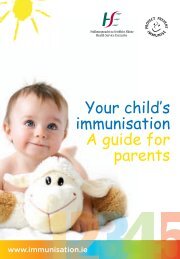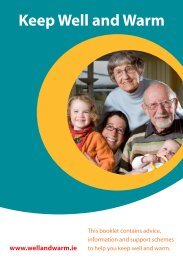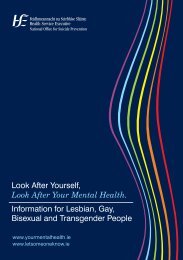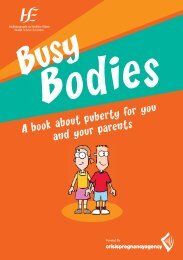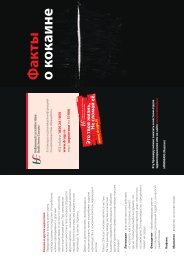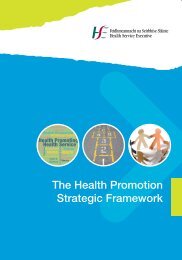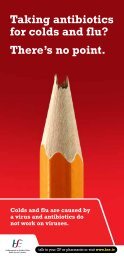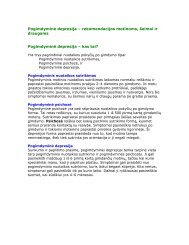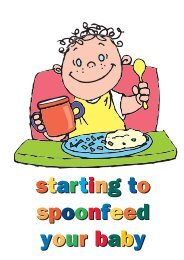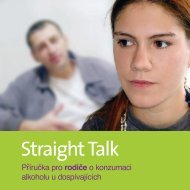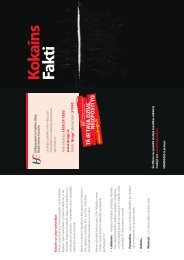Menopause - Health Promotion Unit
Menopause - Health Promotion Unit
Menopause - Health Promotion Unit
You also want an ePaper? Increase the reach of your titles
YUMPU automatically turns print PDFs into web optimized ePapers that Google loves.
<strong>Menopause</strong><br />
A Guide
<strong>Menopause</strong><br />
A Guide<br />
July 2008
Contents<br />
Introduction ...........................................................................<br />
5<br />
Section 1<br />
What is the menopause?..........................................<br />
• When does the menopause happen? ....................................<br />
• How do I know if I’m menopausal? .......................................<br />
• Can I get pregnant during the menopause? ...........................<br />
• What to expect from your doctor ..........................................<br />
7<br />
9<br />
10<br />
11<br />
11<br />
Section 2<br />
Symptoms of the menopause ...........................<br />
• How the menopause affects your body .................................<br />
• How the menopause affects your mind .................................<br />
Section 3<br />
Managing your menopause ..............................<br />
• Get active and eat healthily ..................................................<br />
• How does physical activity help?...........................................<br />
• Looking after your bones ......................................................<br />
• Managing your other symptoms ...........................................<br />
13<br />
14<br />
18<br />
21<br />
22<br />
26<br />
28<br />
31
Section 4<br />
Hormone replacement therapy (HRT)..........<br />
• What is HRT? ......................................................................<br />
• How do I take HRT? ............................................................<br />
• How long should I take HRT for? ..........................................<br />
• Relief of symptoms ..............................................................<br />
• Side effects of HRT .............................................................<br />
• Risks of HRT .......................................................................<br />
33<br />
34<br />
35<br />
35<br />
36<br />
36<br />
36<br />
Section 5<br />
Complementary and alternative therapy .......<br />
• Questions you should ask your therapist ...............................<br />
39<br />
41<br />
More information and useful contacts ..................................<br />
42
Introduction<br />
<strong>Menopause</strong> is a normal event in a woman’s life. The years before<br />
may have been taken up with rearing your family, building<br />
relationships and your career. Around the time of the menopause<br />
many people, men and women, are beginning a new stage of their<br />
lives. Your relationships with your partner, parents, children or close<br />
friends change as they too become older. Your attitude to work may<br />
change; you may look for new challenges or feel you want to slow<br />
things down.<br />
Together with the symptoms of the menopause, it is hardly surprising<br />
that some women fi nd this time diffi cult. However, there are also positive<br />
aspects to life after the menopause. Periods will no longer be an issue<br />
and you won’t have to think about pregnancy. While the menopause<br />
signals the end of your childbearing years, it is also the start of a new<br />
phase of your life.<br />
This booklet has been developed by the Women’s <strong>Health</strong> Council and the<br />
<strong>Health</strong> Service Executive. It includes information on:<br />
• what the menopause is and why you experience the<br />
menopause;<br />
• symptoms of the menopause;<br />
• how to manage these symptoms; and<br />
• how to look after your health after the menopause.<br />
It may not answer all your questions, but we hope it will be a useful<br />
guide. You should talk to your doctor about any questions or problems<br />
you may have.<br />
5
Section 1<br />
What is<br />
the menopause?<br />
7
What is the menopause?<br />
Medically speaking, menopause means your periods have<br />
stopped for one year. However, most women use the word in a<br />
wider sense to mean the years before and just after menopause.<br />
The menopause is a natural part of your life. It marks the end of<br />
your fertility – that is your ability to get pregnant and have children.<br />
At puberty (usually in your early teenage years) you began to<br />
have monthly hormonal cycles that resulted in your periods. This<br />
is called the menstrual cycle. During the early part of each cycle<br />
the levels of the hormone oestrogen rise, stimulating the growth<br />
of an egg in your ovaries. At ovulation an egg is released from<br />
one of your two ovaries. Then another hormone, progesterone,<br />
stimulates the lining of the uterus to thicken. If the egg is not<br />
fertilised by a sperm, your hormone levels drop and the lining is<br />
shed as a period.<br />
As you get older, you ovulate less often, which is why your fertility<br />
level goes down with age. As you approach the menopause,<br />
you may not always ovulate and the release of oestrogen and<br />
progesterone can become irregular. Your ovaries gradually become<br />
less active and you produce much less oestrogen. Eventually the<br />
ovary stops functioning and you release no more eggs. The release<br />
of oestrogen and progesterone also virtually stops.<br />
These changing hormone levels are the reason for many of the<br />
symptoms of the menopause. If your hormone levels reduce<br />
slowly, you may only realise you have reached the menopause<br />
when your periods stop.<br />
8
When does<br />
the menopause happen?<br />
The menopause can start at any time from your late 30s to late<br />
50s. For most women it happens between age 48 and 55. A<br />
natural menopause between the ages of 40 and 45 is called an<br />
early menopause. A natural menopause before the age of 40 is<br />
considered a premature menopause.<br />
MENOPAUSE<br />
Premature menopause can be a particularly diffi cult experience.<br />
If this happens to you, you should talk to your doctor about<br />
having special tests to fi nd out the cause. 1<br />
For some women, the menopause may be caused by cancer<br />
treatments such as chemotherapy or radiotherapy, or by having<br />
ovaries removed during a hysterectomy (womb surgically<br />
removed). This sudden stop in the production of hormones may<br />
lead to symptoms. These may be another complication of an<br />
already traumatic illness.<br />
1<br />
For more information on premature menopause, see The Daisy Network, a premature menopause<br />
support group in the UK, www.daisynetwork.org.uk<br />
9
How do I know<br />
if I’m menopausal?<br />
If you are in your mid to late 40s and you have some of the<br />
following symptoms you may be menopausal.<br />
Physical<br />
Psychological<br />
• Irregular periods<br />
• Hot fl ushes<br />
• Night sweats<br />
• Heart palpitations<br />
• Decreased libido<br />
(sex drive)<br />
• Mood swings<br />
• Irritability<br />
• Increasing anxiety<br />
• Insomnia<br />
• Poor sleep pattern<br />
• Diffi culty concentrating<br />
• Forgetfulness<br />
Many women go through this stage of their lives without any<br />
problems. For those who do have problems, each woman’s<br />
experience may be different. Use the information in this booklet<br />
as a guide. It may help to speak with your doctor or a friend who<br />
has been through the menopause.<br />
You may start to experience some symptoms up to two years<br />
before your periods stop. You may experience a few days or<br />
weeks of symptoms followed by weeks when none occur.<br />
After your last period you may continue to have symptoms for<br />
a number of years. It is not unusual for some women to have<br />
occasional symptoms into their 60s and sometimes 70s.<br />
If your symptoms cause you distress, talk to your doctor.<br />
They will give you advice on managing your symptoms and may<br />
discuss medical treatments such as HRT – hormone replacement<br />
therapy (see p. 33). Some women use complementary or<br />
alternative therapies to relieve their symptoms (see p. 39).<br />
10
Can I get pregnant during<br />
the menopause?<br />
During the menopause it can be diffi cult to know when you are<br />
ovulating, especially if your periods are irregular. You can get<br />
pregnant around this time.<br />
MENOPAUSE<br />
If you don’t want to become pregnant, you should use<br />
contraception until you have not had a period or any bleeding for:<br />
• two years if you are aged under 50, or<br />
• one year if you are aged 50 or over.<br />
Talk to your doctor or family planning clinic about what<br />
contraception to use.<br />
What to expect from your doctor<br />
When you visit your doctor to discuss the menopause you<br />
can expect to:<br />
• talk about your medical history – when you had your last<br />
period, what symptoms you are experiencing, what<br />
contraception you use, any other conditions you have and<br />
medication you take and your family history of certain<br />
diseases such as breast cancer;<br />
• talk about how your menopause symptoms are<br />
affecting you;<br />
• discuss your options such as lifestyle changes, HRT and<br />
complementary therapies;<br />
• discuss other health issues, such as osteoporosis and<br />
heart disease, as well as breast and cervical screening; and<br />
• discuss contraception – because you may still be ovulating<br />
and could become pregnant.<br />
11
Your doctor can usually confi rm you are menopausal based on<br />
your clinical history. In some cases, your doctor may take a blood<br />
test to check your hormone levels, but this is not routinely done.<br />
You may need more than one visit to monitor your symptoms and<br />
to discuss all the issues you have. You can use this booklet to<br />
identify issues that you want to discuss with your GP.<br />
12
Section 2<br />
Symptoms of<br />
the menopause<br />
13
How the menopause affects<br />
your body<br />
Irregular or heavy periods<br />
Irregular periods are often the fi rst sign of the menopause. For<br />
some women, periods become more regular, while for others they<br />
become less regular. You may experience heavier bleeding and<br />
periods that last longer. Over time, periods become less regular,<br />
with occasional skipped periods, until they fi nally stop.<br />
Self-help tips<br />
• You can relieve mild period pain with gentle physical activity<br />
or heat. You may need painkillers for stronger pain. Talk to<br />
your doctor or pharmacist.<br />
• Heavy bleeding and longer periods can reduce your iron levels,<br />
so increase the amount of iron-rich food you eat, such as lean<br />
red meat, fi sh, poultry, green leafy vegetables and enriched<br />
whole grain breads and cereals. Try to combine these<br />
with food or drinks rich in vitamin C to help your body<br />
absorb iron.<br />
• As you may not know when to expect your period, keep some<br />
sanitary pads or tampons at home, at work and in your bag.<br />
If you have very heavy bleeding, talk to your doctor about further<br />
investigation and management.<br />
14
Hot flushes and night sweats<br />
Hot fl ushes are the most typical symptom of the menopause.<br />
They generally appear some months or years before your<br />
periods actually stop. They are caused by changes in your<br />
body’s temperature control. You may experience a feeling of<br />
heat in your face, neck and chest, accompanied by a red fl ush<br />
and followed by sweating all over. They can happen without<br />
warning but may be brought on by a hot drink (especially<br />
caffeine), spicy food, alcohol, changes in room temperature<br />
and stress.<br />
SYMPTOMS<br />
Hot fl ushes at night are called ‘night sweats’ and are not always<br />
accompanied by the feelings of heat. They can disturb your<br />
sleep, making you tired the next day, and affect your ability to<br />
concentrate and lower your energy levels.<br />
Some women also experience headaches, palpitations, shaking<br />
and dizziness during and after a hot fl ush.<br />
Self-help tips<br />
• Natural fabrics such as cotton may be more comfortable to<br />
wear and will absorb moisture.<br />
• Wear layers of clothes that you can easily take on and off as<br />
your body temperature changes.<br />
• Have bed clothes that you can throw on and off easily.<br />
• A cold drink often helps to control the fl ush – keep a glass of<br />
water beside your bed at night so you can drink it quickly if a<br />
fl ush begins.<br />
• Water sprays or moist wipes can help lower your skin<br />
temperature.<br />
15
• Certain food and hot drinks may trigger fl ushes. Try to identify<br />
if there are particular things that trigger your fl ushes and avoid<br />
them if you can.<br />
• Regular moderate physical activity may help.<br />
Vaginal dryness, discomfort,<br />
burning and itching<br />
The skin of your vagina depends on oestrogen to stay thick<br />
and moist. It is particularly sensitive to lower oestrogen levels.<br />
After the menopause, your body may produce enough oestrogen<br />
to keep your vagina moist. If not, you may notice a dryness and<br />
discomfort in your vagina. This can make sex uncomfortable.<br />
Self-help tips<br />
• Wear comfortable underwear. You might want to try<br />
different fabrics.<br />
• Use a water-based lubricating jelly if sex has become<br />
uncomfortable. You can get these over the counter in<br />
pharmacies.<br />
• It may also help to talk about this with your partner.<br />
Libido (interest in sex)<br />
You may fi nd that you are less interested in sex than before.<br />
This could be the result of other stress in your own or your partner’s<br />
life and your interest in sex may return when this stress has gone.<br />
16
Vaginal dryness after the menopause can make sex uncomfortable<br />
and night sweats may make you tired, both of which can affect<br />
your sex drive. It can help to talk to your partner about any worries<br />
you may have. Relationship counselling or sex therapy may also<br />
benefi t you and your partner. Following the self-help tips for vaginal<br />
dryness and night sweats may help as well.<br />
Not all women lose interest in sex after the menopause. Some<br />
women fi nd they can relax and enjoy sex even more now they no<br />
longer have to worry about getting pregnant.<br />
SYMPTOMS<br />
Insomnia – sleep problems<br />
You might fi nd that you have trouble sleeping. This might be<br />
because of night sweats, having to go to the toilet often or<br />
anxiety over your menopause and other issues in your life. Not<br />
having a good night’s sleep can disrupt your life. You may fi nd<br />
that it makes other symptoms worse and makes it more diffi cult<br />
to cope both with your menopause and life in general.<br />
Self-help tips<br />
• Physical activity can help you sleep better, as well as help to<br />
relieve other symptoms.<br />
• Avoid stimulating drinks and food (such as tea, coffee or spicy<br />
foods) before you go to bed.<br />
• If you wake during the night, it can help to get up and have a<br />
drink or read until you feel tired again.<br />
• If you feel your sleep is disturbed by anxiety, it might help<br />
to talk to friends or family or a counsellor.<br />
17
How the menopause<br />
affects your mind<br />
Many of the psychological symptoms – such as mood swings,<br />
irritability, anxiety, diffi culty coping, forgetfulness and diffi culty<br />
concentrating – may be related to hormonal changes and the<br />
physical symptoms they cause. Managing your physical<br />
symptoms may improve the psychological symptoms as well.<br />
Depression, anxiety and panic attacks<br />
While there are many causes of depression and anxiety,<br />
the symptoms of the menopause may contribute to these<br />
feelings. For example, night sweats can disturb your sleep<br />
and tiredness makes it harder to cope with stress. Your<br />
hormone levels may also affect your mood. This is often a time<br />
of change and stress for women, and this can contribute to<br />
feelings of depression.<br />
Some women experience panic attacks for the first time at<br />
menopause. A panic attack is a sudden onset of intense fear<br />
and inability to cope. This can upset and frighten you, and you<br />
should talk to your doctor about it.<br />
Self-help tips<br />
• Talk to friends and family about how you are feeling. This may<br />
help both you and them understand what you are going<br />
through. It may also help you fi nd out the exact cause of<br />
your feelings.<br />
18
• Take each day at a time.<br />
• Take time to look after yourself – relax, go for a walk,<br />
take up a hobby, such as yoga or meditation.<br />
• A healthy diet and regular physical activity will also help you<br />
deal with stress.<br />
• It can help to contact a support group. Groups such as<br />
Aware and Mental <strong>Health</strong> Ireland can help to support and<br />
reassure you (see p. 43).<br />
• If you are worried or your feelings of anxiety and depression<br />
get worse or continue for more than two weeks, talk to<br />
your doctor.<br />
SYMPTOMS<br />
Forgetfulness<br />
You may fi nd that you are forgetting things, for example<br />
forgetting what you went into a shop for or where you have<br />
left something. This can annoy and upset you but many<br />
women fi nd that it passes again after the menopause.<br />
Self-help tips<br />
• Write lists and notes for yourself, and leave them on the<br />
kitchen table or the fridge where you’ll see them.<br />
• Ask people to remind you of things.<br />
• Set reminders in your mobile phone or write on the calendar.<br />
• Try to always use the same places for things, for example<br />
always put your keys or car-park ticket into the same pocket<br />
in your bag.<br />
19
Section 3<br />
Managing<br />
your menopause<br />
21
Managing<br />
your menopause<br />
Every woman’s experience of the menopause is different and how<br />
you decide to manage your menopause will depend on your age,<br />
what symptoms you have and how they affect your quality of life.<br />
There are a number of things you can do to help manage your<br />
menopause such as:<br />
• being active and eating healthily<br />
• taking medical treatments such as HRT, and<br />
• using complementary and alternative therapies.<br />
Get active and eat healthily<br />
The menopause is a great opportunity to look at what you do<br />
and what you eat and get the balance right. Before menopause,<br />
women are protected against a number of diseases, such<br />
as heart disease, stroke and osteoporosis, by the hormone<br />
oestrogen. However, once you stop producing oestrogen, your<br />
risk of these diseases increases. Being physically active and<br />
having a good balanced diet can help protect against them.<br />
Low oestrogen levels also affect other parts of your body such<br />
as your bladder, skin and hair (see p. 31).<br />
22
Are you an apple or pear shape?<br />
As you get older you may fi nd that it’s easier to put weight on<br />
and harder for you to lose it. This may be partly due to your<br />
metabolism slowing down slightly as you get older, and changes<br />
in your body’s hormones.<br />
Where you carry your weight is also important for reducing your<br />
risk of heart disease. As oestrogen levels decrease in your body,<br />
fat redistributes itself around your stomach and is lost around the<br />
hips and breasts. This gives you an ‘apple’ body shape. Studies<br />
have shown that an apple body shape is linked with increased<br />
risk of heart disease, raised blood pressure, type 2 diabetes and<br />
some types of cancer. A healthy diet and regular exercise can<br />
minimise these risks. If you have extra body fat stored around<br />
your hips you will have a ‘pear’ body shape. This is considered<br />
less harmful to your health.<br />
MANAGING<br />
Apple and pear body shapes<br />
23
Looking after your heart<br />
The risk of heart diseases such as high cholesterol, clogged<br />
arteries, heart attack and stroke increases as you get older.<br />
The main risk factors for heart disease include a family history,<br />
smoking, high cholesterol, high blood pressure and being<br />
overweight.<br />
Heart disease is often thought of as a ‘male’ illness but this is<br />
not true. Overall, men and women are equally affected by heart<br />
disease. Men are at risk of heart disease and heart attacks at a<br />
younger age, as oestrogen reduces women’s risk of heart disease<br />
before the menopause. From menopause onwards, your risk is<br />
the same as a man’s.<br />
For everyone, being more active and eating healthily is the best<br />
way to reduce your risk of heart disease. If you smoke, quitting<br />
reduces your risk of heart disease immediately.<br />
Tips for healthy eating<br />
Reduce the amount of saturated fat (hard fat)<br />
Choose olive oil or rapeseed oil instead. A fat called ‘omega-3’<br />
is particularly good for your heart. Oily fi sh such as sardines,<br />
mackerel, herrings, kippers, trout and salmon are the best<br />
sources of these good fats. You should eat one portion of oily<br />
fi sh a week. All types of fat are high in calories, so try to limit<br />
the total amount of fat you eat.<br />
24
Increase your fibre<br />
Soluble fi bre can help to lower cholesterol and reduce your risk<br />
of heart disease. This type of fi bre is found in oats, barley, pulses<br />
and some fruit and vegetables. Drink plenty of water or other<br />
fl uids – at least eight glasses a day.<br />
Eat at least 5 portions of fruit and vegetables a day<br />
Eating foods with anti-oxidant vitamins A, C and E and other<br />
nutrients increases your protection against heart disease<br />
and cancer.<br />
Lower your salt intake<br />
To help prevent high blood pressure, reduce the amount<br />
of salt you add when cooking and at the table. Cut down on<br />
processed foods and prepare meals from fresh ingredients<br />
where possible.<br />
You can get more information on healthy eating from your local<br />
<strong>Health</strong> <strong>Promotion</strong> Department (contact details on p.42) or at<br />
www.healthpromotion.ie or from the Irish Nutrition and Dietetic<br />
Institute website at www.indi.ie (contact details on p.44).<br />
MANAGING<br />
25
How does physical activity help?<br />
The good news is that regular activity can help manage many<br />
of the symptoms of menopause. Physical activity helps to:<br />
Reduce and prevent symptoms, such as<br />
• Sleep disturbances, insomnia • Joint pain<br />
• Anxiety, irritability, depression • Hot fl ushes<br />
• Vaginal and bladder atrophy<br />
Reduce your risk of<br />
• Heart disease<br />
• Osteoporosis<br />
• Weight gain<br />
Improve and increase your<br />
• Strength, stamina, fl exibility, energy<br />
• Function of vital organs<br />
• Condition of heart, lungs and muscles<br />
What activities are best?<br />
To get the benefi ts of physical activity, you need a balanced<br />
programme of aerobic activity, weight-bearing activity and fl exibility.<br />
Aerobic activities are great for your heart and lungs and also for<br />
losing weight. Aerobic activities mean you are constantly moving<br />
over a period of time. Examples include swimming and cycling.<br />
Weight-bearing activities are when your bones and muscles<br />
work against gravity and include physical activity in which your feet<br />
and legs bear your weight. This type of activity will benefi t your<br />
muscles and bones. Examples include walking and dancing.<br />
26
Flexibility or stretching activities will reduce your risk of injury<br />
and allow your joints to move more freely. Examples include<br />
yoga and bowling.<br />
How long should I be active for?<br />
To get the most benefi t you should be active at a moderate level<br />
for at least 30 minutes on fi ve or more days a week. The good<br />
news is that the minutes don’t have to be in one session – so you<br />
could do two 15-minute sessions or three 10-minute sessions<br />
during the day.<br />
Moderate level activity means you should be able to carry on a<br />
conversation while you exercise. If you are too breathless to talk,<br />
you’re working too hard.<br />
Fitting in fitness<br />
The main thing to remember is to try to fi t physical activity into<br />
your daily life. You could:<br />
MANAGING<br />
• take the stairs instead of the lift,<br />
• park further away from your destination and walk the extra bit,<br />
• put a bit more ‘oomph’ into housework,<br />
• walk or cycle instead of taking the car on short journeys, or<br />
• stretch or dance during the ad breaks on telly!<br />
Remember<br />
If you are starting a new physical activity programme or class,<br />
make sure it suits your level of fi tness. If you have an existing<br />
illness, always check with your doctor before beginning a<br />
new activity.<br />
27
Looking after your bones<br />
Both men and women start to lose calcium from their bones as<br />
they get older. This process speeds up in women at menopause<br />
due to the decrease in oestrogen levels. This calcium loss results<br />
in your bones getting weaker and thinner, especially at the<br />
spine, the hip and the wrist. As the bones get weaker, they may<br />
break more easily and you may get osteoporosis (brittle bones).<br />
Osteoporosis can increase your risk of fracturing a bone such as<br />
your hip, wrist or spine. After the menopause, some women can<br />
lose up to 5% of bone per year, for several years.<br />
Bone thinning itself does not cause any symptoms and<br />
osteoporosis is often called the ‘silent disease’. The fi rst warning<br />
sign can be a fracture after a simple fall or knock.<br />
Risk factors<br />
A family history of osteoporosis increases your risk. Women who<br />
have a low bone density when they reach their menopause are<br />
at highest risk of osteoporosis. Bone density can be measured at<br />
the hip and spine with a DEXA scan.<br />
Smoking is a risk factor for osteoporosis. Women who smoke<br />
have 10% lower bone density. Other risk factors are low levels<br />
of calcium in your diet, lack of regular activity, too much alcohol,<br />
prolonged steroid therapy and thyroid disease. There is some<br />
evidence that treatments such as chemotherapies for breast<br />
cancer may reduce bone density. You should ask your doctor if<br />
you think you may be at increased risk.<br />
28
What you can do<br />
A good calcium-rich diet, vitamin D and plenty of weight-bearing<br />
activity are the best things you can do to protect yourself. If you<br />
smoke – quit. If you drink alcohol, only drink in moderation.<br />
Calcium<br />
Milk and dairy foods are the best sources of calcium and they are<br />
most easily absorbed. Aim for at least 800mg of calcium each day<br />
(3 servings). A serving is equal to 1/3 of a pint of milk, or 1 carton<br />
of yoghurt, or 1 ounce of hard cheese. If you have had a fracture<br />
you may need up to 1500mg of calcium. If you are watching your<br />
cholesterol, use lower fat dairy products such as low fat milk,<br />
cheese and yoghurt, which are also good sources of calcium. If<br />
you’re on a dairy-free diet then make sure you choose alternatives<br />
fortifi ed with calcium.<br />
Vitamin D<br />
Vitamin D is important because it helps your body to use calcium.<br />
Your body can make vitamin D from sunlight. Most people get<br />
enough vitamin D this way, but some people, who are housebound<br />
or who wear clothes that cover most of their body, need to make<br />
sure they get vitamin D from their food. Good food sources of<br />
vitamin D include fi sh liver oils and oily fi sh, such as sardines and<br />
salmon. If you think you are at risk of low vitamin D levels, talk to<br />
your doctor about taking supplements.<br />
MANAGING<br />
Weight-bearing activity<br />
Weight-bearing activity helps your bones to hold on to the minerals<br />
that keep them dense and strong. This prevents or slows down the<br />
progress of osteoporosis. It places an increased ‘load’ or force on<br />
29
your bones. Your bones respond by increasing in mass so the load<br />
can be spread over a larger amount of bone. This type of activity<br />
also improves your balance and co-ordination. This in turn reduces<br />
your risk of falling – falls can result in broken bones. If you already<br />
have osteoporosis, improving your strength, fl exibility and posture<br />
can reduce pain so you can do daily tasks more easily. You should<br />
see your doctor before starting any physical activity programme<br />
(see p. 26 for tips on getting active).<br />
Quit smoking<br />
For information and support to quit smoking, contact the National<br />
Smokers’ Quitline on 1850 201 203.<br />
Medical treatments<br />
Many medical treatments are available to prevent and treat<br />
osteoporosis. Your doctor can advise you on the right treatment<br />
for you.<br />
Hormone replacement therapy (HRT) can help to prevent bone<br />
loss. The benefi t lasts as long as you take it. The benefi t to you<br />
may vary because there are many other lifestyle factors that<br />
contribute to bone loss. It is not your fi rst line of treatment for<br />
osteoporosis, but it may be useful if you have an early menopause<br />
(before age 45).<br />
30
Managing your other symptoms<br />
The lower levels of oestrogen in your body can also affect your<br />
bladder, hair and skin.<br />
Bladder and urinary problems<br />
Like your vagina, the skin of the bladder lining and neck of the<br />
bladder depends on oestrogen for its health. Low oestrogen<br />
levels can mean you need to pass water more often during the<br />
day and at night. It can cause a burning sensation that may seem<br />
like cystitis but there is no infection. Your doctor should be able<br />
to advise you on treatment for this.<br />
Stress incontinence is a small leak of urine (wetting) when you<br />
sneeze, laugh or lift things. It can happen at any age. It is caused<br />
by the muscles in your pelvic fl oor becoming weaker. There are<br />
simple exercises you can do to make them stronger.<br />
MANAGING<br />
Pelvic floor exercises<br />
Pelvic fl oor (or Kegel) exercises will strengthen the muscles that<br />
support the bladder and help control incontinence. As a test, to<br />
fi nd the right muscles, try to stop the fl ow of urine while you’re on<br />
the toilet (you should not do this test more than once per week).<br />
When you have found these muscles, you can practice tightening<br />
and relaxing them anytime, anywhere. You may remember doing<br />
this exercise when you were pregnant or after having a baby. For<br />
more information contact Tirim (see p. 44).<br />
31
Hair, skin and nails<br />
Your skin may become drier, thinner, less elastic and more prone<br />
to bruising. It may also be itchy. Your hair may get thinner and<br />
drier and you may get unwanted hair on your face. You may<br />
need to change your skin and hair care, for example try a richer<br />
face cream or a stronger hair conditioner. Your nails may start to<br />
split, so try to keep your nails clean and dry; wear gloves while<br />
washing up. A nail hardener is available from pharmacies and<br />
may improve the condition of your nails.<br />
<strong>Health</strong> screening<br />
It is important that you get regular health checks. There are two<br />
national screening programmes in Ireland for breast and cervical<br />
cancer. BreastCheck is a free breast screening service available<br />
for women aged 50-64 years. You should have your breasts<br />
screened every two years. It is available in most areas of Ireland,<br />
and will soon be available nationwide.<br />
You should also have a cervical smear test every three years if<br />
you are aged 25-44, and every fi ve years if you are aged 45-60.<br />
If you are over 60 years of age, you should talk to your doctor<br />
about your need for a cervical smear test. A free cervical smear<br />
test programme is available to women aged 25-60 years living in<br />
the mid-west area. This programme is currently being expanded<br />
across the whole country.<br />
32
Section 4<br />
Hormone<br />
Replacement<br />
Therapy (HRT)<br />
33
What is HRT?<br />
HRT provides extra oestrogen to keep your body’s hormone<br />
levels constant. The extra oestrogen helps relieve the symptoms<br />
caused by the fall in hormone levels – hot fl ushes, vaginal dryness<br />
and urinary discomfort.<br />
There are two main types of HRT:<br />
• oestrogen on its own, which is given to women who have<br />
had a hysterectomy (womb surgically removed); and<br />
• oestrogen combined with progestogen, similar to the<br />
progesterone your body produces. You need the<br />
progestogen to reduce your risk of cancer of the womb.<br />
HRT is similar to the contraceptive pill, but the hormone doses<br />
are lower and it is not a contraceptive. Oestrogen in HRT is<br />
similar to the oestrogen produced in your body. The dose of<br />
oestrogen in HRT is much lower than that in the contraceptive<br />
pill. For this reason they have fewer side effects.<br />
If progesterone is used along with oestrogen, it can be taken<br />
in two different ways:<br />
• cyclical or sequential – with a monthly ‘period’; or<br />
• continuous – ‘period free’, recommended if you have not<br />
had a period for at least one year.<br />
You will need to talk to your doctor about whether HRT is<br />
suitable for you. HRT may not be suitable if you have a history<br />
of breast cancer, blood clots, stroke or heart disease. If HRT is<br />
unsuitable for you, your doctor can advise you on alternative<br />
treatments.<br />
34
How do I take HRT?<br />
You can take it as:<br />
• a pill;<br />
• a patch or gel where the hormone is released through the<br />
skin into the bloodstream;<br />
• a cream, pessary or tablet to be absorbed through the skin<br />
of the vagina (helpful for vaginal dryness and urinary<br />
symptoms); or<br />
• an implant under the skin.<br />
Your doctor will tell you more about the different forms and<br />
combinations of HRT.<br />
How long should I take HRT for?<br />
The length of time varies between women. Most women will take it<br />
for 2-3 years; others may take it for longer. You should discuss this<br />
with your doctor.<br />
Directions for taking HRT vary, depending on the form you take it in<br />
and the combinations used. It is very important that you follow the<br />
directions on your prescription.<br />
HRT<br />
Before you start taking HRT, you should have a thorough medical<br />
check-up – blood pressure, breast exam and smear test if needed.<br />
You will need to have a check-up every time you get a repeat<br />
prescription – about every six months.<br />
Some women experience severe menopausal symptoms when<br />
they stop taking HRT. Other women do not experience any return of<br />
symptoms. Your doctor can advise you about how to stop taking HRT.<br />
35
Relief of symptoms<br />
HRT will relieve hot fl ushes and night sweats fi rst. You may notice<br />
a difference in the fi rst four weeks. You may still get occasional<br />
fl ushes regardless of your dose. Your sleep may improve<br />
gradually. Many women who have had severe problems with night<br />
sweats and fl ushes soon notice a ‘tonic’ effect from sleeping<br />
better. Vaginal dryness and urinary symptoms may take 6-8<br />
weeks to improve, depending on how severe they were.<br />
Side effects of HRT<br />
Like the contraceptive pill, not all forms of HRT suit all women.<br />
You should use a therapy specifi c to your needs. You may have<br />
side effects such as breast tenderness, nausea, unexpected<br />
bleeding and premenstrual syndrome-like symptoms. If your<br />
fi rst prescription doesn’t agree with you, talk to your doctor<br />
about changing the dose, the form you take it in or the levels of<br />
progestogen. Keep in mind that minor side effects can often resolve<br />
themselves and it can take time before you feel the positive effects.<br />
Risks of HRT<br />
You may have heard of a number of big studies into the risks<br />
associated with HRT, such as the Women’s <strong>Health</strong> Initiative or the<br />
Million Women Study. There have been mixed, and sometimes<br />
confusing fi ndings from these and other studies.<br />
The studies reported that HRT increased the risk of coronary<br />
heart disease, breast cancer, stroke and blood clots. Since these<br />
fi ndings were published, a further examination of the studies<br />
36
indicates that some of the risks may have been over-estimated and<br />
may only be relevant to older women. Other studies have found<br />
the risks associated with HRT are very small, especially if you use it<br />
for less than fi ve years.<br />
HRT and risk of breast cancer<br />
The most recent studies have identifi ed a small increased risk of<br />
breast cancer linked with taking HRT. However, if you take HRT<br />
for less than 10 years, the increased risk is very small. For women<br />
already on HRT, the risk seems to return to normal within fi ve years<br />
of stopping it. The risk of developing breast cancer due to taking<br />
HRT for fi ve years is estimated to be between one and six extra<br />
women out of 1000, depending on the type of HRT.<br />
Combined HRT increases breast cancer risk more than oestrogenonly<br />
HRT. The increased risk due to taking HRT for 10 years is<br />
between fi ve and 19 extra women out of 1000, again depending<br />
on the type of HRT. This information is shown in the table below.<br />
Type of HRT<br />
used<br />
Number of years<br />
HRT used<br />
(from the age<br />
of 50)<br />
Expected<br />
number of<br />
women per 1000<br />
expected to<br />
develop breast<br />
cancer between<br />
the ages of 50-<br />
65 years<br />
Number of extra<br />
cases of breast<br />
cancer per 1000<br />
women using<br />
HRT compared<br />
to 1000 women<br />
who have never<br />
used HRT<br />
HRT<br />
None<br />
Oestrogen only<br />
Oestrogen only<br />
Combined<br />
Combined<br />
-<br />
5 years<br />
10 years<br />
5 years<br />
10 years<br />
32<br />
33-34<br />
37<br />
38<br />
51<br />
-<br />
1-2<br />
5<br />
6<br />
19<br />
37
HRT and risk of blood clot<br />
Studies have also shown that HRT increases the risk of a blood<br />
clot in the veins, also called deep vein thrombosis, especially<br />
within the fi rst year of use. However, the risk is still very small.<br />
These blood clots are not always serious, but if a clot travels to<br />
the lungs, it can cause chest pain, breathlessness, collapse or<br />
even death. This is known as pulmonary embolism.<br />
HRT and risk of blood clot (fi gures are an average over a 5 year period)<br />
Women in their 50s<br />
Women in their 60s<br />
Number<br />
expected<br />
Not on HRT<br />
On HRT<br />
Not on HRT<br />
On HRT<br />
to get a<br />
blood clot<br />
5 out of<br />
every 1000<br />
10 out of<br />
every 1000<br />
8 out of<br />
every 1000<br />
14 out of<br />
every 1000<br />
If you have questions about the risks of HRT, you might like to<br />
bring this booklet to your next visit with your doctor.<br />
38
Section 5<br />
Complementary<br />
and alternative<br />
therapy<br />
39
Complementary and<br />
alternative therapy<br />
Some women use complementary therapies and alternative<br />
medicines to relieve their menopause symptoms.<br />
Complementary therapies include acupuncture, refl exology,<br />
homeopathy and aromatherapy. There is very limited scientifi c<br />
evidence to suggest that acupuncture and homeopathy can<br />
be helpful in relieving hot fl ushes. Both aromatherapy and<br />
refl exology have not been found to alleviate menopausal<br />
symptoms.<br />
Alternative medicines available over-the-counter include herbal,<br />
homeopathic and dietary remedies that may help relieve<br />
menopausal symptoms. For some menopausal women, black<br />
cohosh and ginseng have been found to decrease anxiety and<br />
depression and ginkgo has been found to improve memory.<br />
There is a lack of good quality scientifi c evidence on the<br />
general effectiveness and safety of complementary therapies<br />
and alternative medicines. However, some women may fi nd<br />
the therapies benefi t their general health and well being or help<br />
with some menopausal symptoms.<br />
Although natural, some alternative medicines may be unsafe<br />
if not used properly. It’s important to tell your doctor about<br />
any alternative medicines or supplements that you are taking.<br />
Different treatments can have an effect on each other or can<br />
even be dangerous 2 .<br />
40
Questions you should ask<br />
your therapist<br />
• What treatment they recommend and how it might react with<br />
other treatments or medication you are on. Keep asking if you<br />
don’t understand the answers.<br />
• How long the treatment will last and what it will cost. Beware of<br />
therapists who ask for very high fees or pre-payment of fees.<br />
If they are a member of a professional association you should<br />
contact the association for advice on average fees.<br />
• What qualifi cations they hold and how long they have trained.<br />
Each therapist is responsible for ensuring that they are trained<br />
and qualifi ed to the level they need to work safely. Remember<br />
that the level of qualifi cation and training can vary.<br />
• Do they hold professional indemnity insurance?<br />
2 Managing <strong>Menopause</strong>: A Review of the Bio-Medical Evidence, published by the Women’s <strong>Health</strong><br />
Council, provides a summary of the scientifi c evidence on the effectiveness of complementary and<br />
alternative therapies. You can get the publication from the Women’s <strong>Health</strong> Council’s menopause<br />
website, www.whc.ie/menopause<br />
CAT<br />
41
More information and<br />
useful contacts<br />
The menopause is a natural life event. Like other changes and<br />
challenges you face in life, it often helps to talk to people – to friends<br />
and family, in a support group or to a counsellor. You may like to contact<br />
some of the following organisations for more information and support.<br />
The Women’s <strong>Health</strong> Council<br />
Block D, Irish Life Centre, Abbey Street Lower, Dublin 1<br />
T. (01) 878 3777<br />
W. www.whc.ie/menopause<br />
HSE <strong>Health</strong> <strong>Promotion</strong> Departments<br />
HSE Infoline 1850 24 1850<br />
W. www.healthpromotion.ie<br />
<strong>Menopause</strong> organisations<br />
British <strong>Menopause</strong> Society<br />
4-6 Eton Place, Marlow, Bucks SL7 2QA<br />
T. +44 (0)1628 890 199<br />
W. www.thebms.org.uk<br />
<strong>Menopause</strong> Matters<br />
W. www.menopausematters.co.uk<br />
(Website provides easily accessible, up-to-date, accurate<br />
information about the menopause.)<br />
The Daisy Network<br />
(premature menopause support group in UK)<br />
PO Box 183, Rossendale BB4 6WZ<br />
W. www.daisynetwork.org.uk<br />
42
General health organisations<br />
Aware – Helping to defeat depression<br />
72 Lower Leeson Street, Dublin 2<br />
Helpline 1890 303 202<br />
W. www.aware.ie<br />
Mental <strong>Health</strong> Ireland<br />
6 Adelaide Street, Dun Laoghaire, Co. Dublin<br />
T. (01) 284 1166<br />
W. www.mentalhealthireland.ie<br />
BreastCheck – The National Breast Screening Programme<br />
King’s Inns House, 200 Parnell Street, Dublin 1<br />
Freephone 1800 45 45 55<br />
W. www.breastcheck.ie<br />
National Breast Cancer Helpline<br />
Freephone 1800 30 90 40<br />
Irish Cancer Society<br />
43/45 Northumberland Road, Dublin 4<br />
T. (01) 231 0500<br />
W. www.cancer.ie<br />
Irish Cervical Screening Programme<br />
St. Joseph’s Hospital, Mulgrave Street,<br />
Freepost LK407, Limerick<br />
Freephone 1800 252 600<br />
W. www.icsp.ie<br />
Irish Heart Foundation<br />
4 Clyde Road, Ballsbridge, Dublin 4<br />
T. (01) 668 5001<br />
W. www.irishheart.ie<br />
43
National Osteoporosis Society (UK)<br />
Camerton, Bath, BA2 0PJ<br />
T. 0044 (0) 845 450 0230<br />
W. www.nos.org.uk<br />
Irish Osteoporosis Society<br />
33 Pearse Street, Dublin 2<br />
T. 1890 252 751<br />
W. www.irishosteoporosis.ie<br />
The National Smokers’ Quitline<br />
1850 201 203<br />
Tirim – Be free from OAB (Bladder problems)<br />
Helpline 1850 233 733<br />
W. www.tirim.ie or www.befreefromoab.ie<br />
Irish Family Planning Association<br />
60 Amiens Street, Dublin 1<br />
T. (01) 806 9444<br />
W. www.ifpa.ie<br />
The Family Support Agency<br />
St. Stephens Green House, Earlsfort Terrace, Dublin 2<br />
T. (01) 611 4100<br />
W. www.fsa.ie<br />
Irish Nutrition and Dietetic Institute<br />
Ashgrove House, Kill Avenue, Dun Laoghaire, Co. Dublin<br />
T. (01) 280 4839<br />
W. www.indi.ie<br />
Well Woman Centres<br />
(Head Offi ce), 25 Capel Street, Dublin 1<br />
T. (01) 874 9243<br />
W. www.wellwomancentre.ie<br />
44
Published by: The Women’s <strong>Health</strong> Council and <strong>Health</strong> Service Executive<br />
Publication date: July 2008 • Review date: July 2011<br />
Order code: HPM00069<br />
Further copies can be ordered from:<br />
<strong>Health</strong> Service Executive Local <strong>Health</strong> <strong>Promotion</strong> Departments<br />
HSE Infoline 1850 24 1850 or www.healthpromotion.ie



